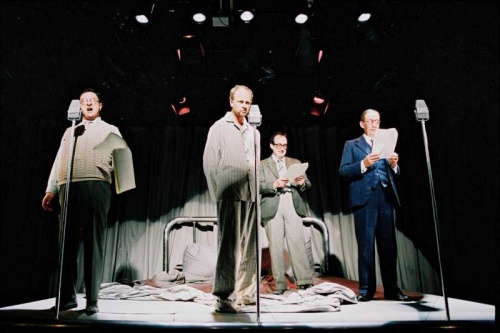Ying Tong
10/06/2006 - 15/07/2006
Production Details
Written by Roy Smiles
Directed by Ross Gumbley
Sound design by Geoff Nunn
An hilariously ingenious tribute to one of the world’s best loved comedy acts, Roy Smiles’ nostalgic look at the dying days of The Goon Show is a superb mix of ridiculous fun tempered with genuine sadness.
Revolving around Spike Milligan’s struggle to regain his mental health after his nervous breakdown in 1960, the action ricochets between a psychiatric hospital, a BBC radio station and the local pub.
In a valiant effort to get Milligan to produce more of his inspired scripts, fellow Goons Secombe and Sellers, along with the show’s presenter Wallace Greenslade, concoct a menagerie of ridiculous characters to coax, coerce or con Milligan into cooperating with them.
CAST
Steven Papps
Peter Rowley
Alisdair Kincaid
Geoffrey Heath
Theatre ,
2 hrs incl. interval
Comedy of manias needs more manic energy
Review by Ron Kjestrup 11th Jun 2006
I’ve often thought that there is an aspect of theatrical history under-taught to young actors. An understanding of the brilliance of the early radio comedy pioneers and their successors is as necessary as any Ionesco, Pinter or clown practice to producing quality comedy and should be an integral part of any study. The opportunity currently exists at the Court for an entertaining history lesson.
Spike Milligan once said that all he wanted was the chance to prove that money couldn’t make him happy. He got his chance with the enormously popular 1950’s radio comedy, the Goon Show. Spike created a seminal comedy event that massively influenced two generations of performers and made stars of his cohorts Harry Secombe and Peter Sellers. It also drove him nuts – literally.
Roy Smiles’ Ying Tong is a journey through Milligan’s psyche during the last days of the Goon show. Set, also literally, in his sick bed – a giant grey bed, crash landed on a stage oozing fragments of words – the characters of Milligan’s life (both real and imagined) emerge through trap doors. They conspire to berate, cajole and provoke him into analysing his condition and coming up with one last Goon script.
Despite his many jokes about his condition Milligan was genuinely very ill during this period. It is a tribute to Smiles’ script that we are not plunged into a morose examination of mental illness but root for Spike as he desperately hurls one liners about trying to find his way out of the depths of depression and mania.
This being the Goons we also get a lot of laughs but theatre goers expecting recreations of classic Goon’s scripts will be disappointed. As Steven Papps’ Milligan says, this isn’t a Goons script. It is more an exploration and a celebration of Spike’s struggle. We get a bit of a history lesson, as well. Insights into the workings of one of comedy’s greatest teams.
It would be an impossible task to find enough actors who could all flawlessly impersonate the real Goons performers and their myriad characters. Director, Ross Gumbly, has seen this is not entirely necessary and has brought together a team who can capture the emotion of the piece and carry the diverse performances required. They recreate enough of the original sound to carry us through the initial set up to the recesses of Spike’s tortured mind.
The weakest parts of the production are when accurate impersonations are required but it’s not these moments that we remember. Papps doesn’t try to mimic Spike at all except for his Eccles moments. As the play progresses and we become more sympathetic with the man rather than expecting the image this approach proves to be the best choice. Papps captures a Milligan trapped in his own painful imagination and even at his darkest moments expressing himself through his comedy.
Peter Rowley and Alisdair Kincaid as Secombe and Sellers have the difficult task of carrying a huge number of characters and their core roles. They struggle at times to delineate the moments. This is also a function of a weakness in the production, I think, as it seems to lack the manic pace that this sort of comedy requires.
The set, although a marvellous idea and often very clever, seems to work against them. The actors should be dripping sweat by the end of the night but instead seem to stroll through the evening at an almost leisurely pace. It is a very complicated piece, though, and the usual four week rehearsal period in New Zealand theatre is never enough to build the sort of cohesion required for this sort of production. Perhaps it will settle into a more satisfying rhythm as the season progresses.
I have to mention the sound design because it is (of course) an integral part of the production and works a treat. Geoff Nunn not only provides all the nutty content required for Goons inspired scripts but a wonderful texture as well.
Despite the teething issues, this is a show well worth seeing. As I said earlier it’s not really the Goons or the comedy that this play is about, though it is very funny. It’s actually about one of Entertainment’s most endearing and brilliant characters. And it’s about the nature of genius.
Spike, as always, says it best. When Geoffrey Heath’s well drawn doctor replies to Milligan’s "I must write" with "But it’s just gibberish, Spike", Milligan replies, "Yes, but it’s my gibberish." Every aspiring thespian should be hog tied to a speeding Ray Ellington Quartet and forced by a platoon of snow covered Tottingham Council cleaning ladies to listen to such gibberish.
Copyright © in the review belongs to the reviewer






Comments